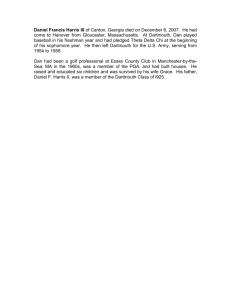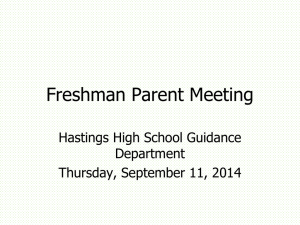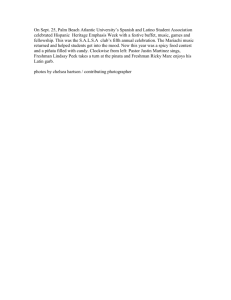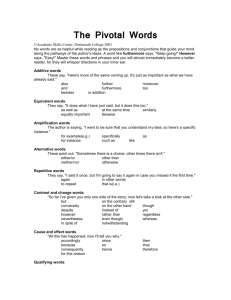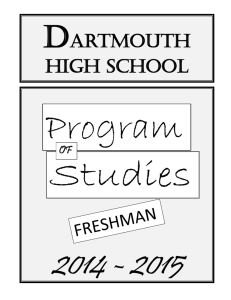the Freshmen Program of Studies, 2016-2017
advertisement
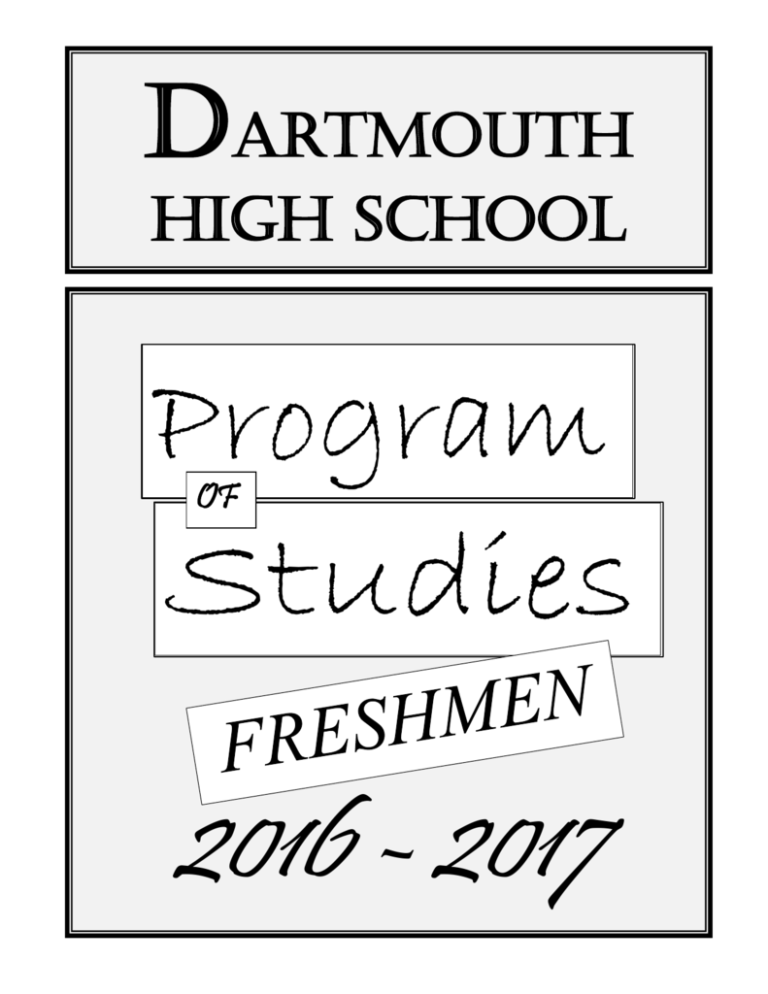
Dartmouth High School Program Studies OF 2016 - 2017 Dartmouth High School Freshman Program of Studies, Draft 2016 2|P age Dartmouth High School Freshman Program of Studies, Draft 2016 DARTMOUTH HIGH SCHOOL CORE VALUES AND BELIEFS At Dartmouth High School We Value and Believe In: A safe learning environment Open and respectful sharing of opinions and ideas A learning environment that fosters respect for self and others Thoughtful instruction and rigorous assessment designed around common curricula LEARNING EXPECTATIONS All students must: Define and monitor plan to achieve self-defined academic goals Communicate knowledge through a variety of writing styles Problem solve in a variety of settings Demonstrate respect for self and others 3|P age Dartmouth High School Freshman Program of Studies, Draft 2016 The mission of the Dartmouth Public Schools is to provide a quality education for all learners. FOREWORD The Dartmouth High School Program of Studies provides students and families with the information needed to develop a four year plan to support post-secondary goals. Students should select courses with high school graduation requirements in mind as well as taking advantage of the variety and depth of course offerings in core and elective areas. Students are encouraged to be responsible life-long learners and to challenge themselves to meet the academic, social and civic competencies outlined in our Core Values, Beliefs and Learning Expectations. Dartmouth High School offers interscholastic sports, a wide array of clubs and service organizations, music, art, and theatre programs to enhance the high school experience. GUIDANCE There will be ample opportunities to discuss choices with teachers and guidance counselors. The choice of a student’s courses and activities for the upcoming school year should be based on the student’s individual interests, skills and future plans. The guidance counselors meet with students in several sessions to best match the students’ choices to individual needs and work with students to develop a fouryear plan. All guidance services and materials are free from bias and stereotypes on the basis of race, color, sex, religion, national origin, sexual identity, sexual orientation, disability, homelessness or any other legally protected status. Limited English proficient and disabled students facilitate their access to these services, including testing, through the additional support of their in-school liaisons. Parents and guardians wishing to discuss selection of their child’s courses may consult with the guidance counselor assigned to their child. Appointments may be arranged by contacting the Guidance Office (508-961-2730). GENERAL INFORMATION ACCREDITATION – Dartmouth High School is accredited by the New England Association of Schools and Colleges and by the Massachusetts Department of Elementary and Secondary Education. ACADEMIC PROMOTION – Every student enrolled at Dartmouth High School is expected to make continuous progress toward graduation requirements. At the end of each year an evaluation of each student’s progress will be made by thorough transcript review. It is the shared responsibility of the student, parent, and counselor to track the completion of courses. It is expected that students will meet the following credit guidelines. Year of High School End of Freshman Year End of Sophomore Year End of Junior Year End of Senior Year Credits 6 12 20 28 At the end of the sophomore and junior years, students will be re-assigned to the appropriate grade-level based on credits earned. 4|P age Dartmouth High School Freshman Program of Studies, Draft 2016 GRADUATION REQUIREMENTS – All students must have 28 credits to be allowed to participate in the graduation ceremony with their class. In order to receive a diploma from a public high school in Massachusetts, a student must satisfy the requirements of the issuing institution as well as pass the required portions of the Massachusetts Comprehensive Assessment System (MCAS) Test. Seniors are expected to carry at least four major courses. COURSE OFFERINGS – Every effort is made to run all courses listed in the catalog; however, the principal retains the right to cancel a course at any time. Furthermore, health and safety issues may require that some class sizes be limited. ACADEMIC INFORMATION DARTMOUTH HIGH SCHOOL Requirements for Graduation, (Mass Core) CREDITS/UNITS 4 Units/Credits 4 Units/Credits 3 Units/Credits COURSES English Mathematics Lab-based Science (only 1 Engineering course may be applied to graduation credits) 3 Units/Credits 2 Units/Credits 1 Unit/ Credits 1 Unit/ Credits 2 Units/Credits .5 Unit/ Credits 5 Additional “Core” Courses Additional Learning Opportunities Including: History/Social Science The Same Foreign Language The Arts Freshman Seminar w/Microsoft Office Applications (Class of 2019 .5 credits) Physical Education Health Education Business Computer Science Career and Technology Education And/or Technology Or any other above subject AP Classes Dual Enrollment Service or work-based learning 28 Credits to Graduate and students must pass their competency determination as dictated by the state CLASS LEVELS COLLEGE PREPARATORY – This program is designed to meet the needs of those students who plan to enter liberal arts colleges, universities, state colleges, technical institutes, and 2-year colleges. Most colleges require an applicant to possess a well-rounded academic background and a strong scholastic record in the fields of English, mathematics, science, world language and social studies. HONORS – Honors level courses require substantially more independent work and effort than the comparable college preparatory course. Students in honors courses are expected to be independent learners who complete longer and more complex assignments outside of class. Time management and strong organizational skills are critical as well as the motivation to persevere and to take the initiative in seeking out answers when the material becomes challenging. ADVANCED PLACEMENT – Advanced Placement course offerings are described under each subject area. These are college level courses offered in the high school setting. Success in Advanced Placement courses is considered by most colleges as evidence of the student’s ability to handle college level work and may also be rewarded with academic credit at their school. The ability to analyze and synthesize information from varied sources and positions and to draw conclusions is important for success in these courses. In addition students will be expected to read, write and speak at a level that would be required in college. 5|P age Dartmouth High School Freshman Program of Studies, Draft 2016 REQUIREMENT FOR COLLEGE FRESHMAN CLASS ENTERING . . . Subject English Mathematics Sciences Social Sciences Foreign Languages Electives Fall 2014 Fall 2015 Fall 2016 Fall 207 and beyond 4 courses 3 courses (Algebra I & II and 4 courses (Algebra I & II and Geometry or Geometry or Trigonometry or Trigonometry or comparable coursework) including comparable coursework) mathematics during the final year of high school. 3 courses (drawn from Natural Science and/or 3 courses (drawn from Natural Physical Science and/or Technology/Engineering; Science and/or Physical Science including 2 courses with laboratory and/or Technology/Engineering) work);Technology/engineering courses must be including 3 courses with designated as science courses (taken for science laboratory work credit) by the high school 2 courses (including 1 course in U.S. History) 2 courses (in a single language) 2 courses (from the above subjects or from the Arts & Humanities or Computer Sciences) 6|P age Dartmouth High School Freshman Program of Studies, Draft 2016 7|P age Dartmouth High School Freshman Program of Studies, Draft 2016 8|P age Dartmouth High School Freshman Program of Studies, Draft 2016 9|P age Dartmouth High School Freshman Program of Studies, Draft 2016 ENGLISH 1103 ENGLISH 9 1 credit Students will analyze literature according to genre-specific elements – such as aspects of Shakespearean tragedy or rules of memoir writing. Using close reading strategies, students will analyze literature for what is openly expressed and what is merely implied. Students will develop foundational Common Core skills in composition, research, grammar, and vocabulary. 1104 ENGLISH 9 HONORS 1 credit Students will analyze literature according to genre-specific elements – such as aspects of Shakespearean tragedy or rules of memoir writing. Using close reading strategies, students will analyze literature for what is openly expressed and what is merely implied. Students will develop foundational Common Core skills in composition, research, grammar, and vocabulary. Please refer to the Advanced English Course Content described in the English introduction. 1150 THEATER ARTS 1 credit Students will learn about the various roles and elements that come together in the world of drama. Through improvisational skits and established scenes, students will become acquainted with the thrill, reality, and risk of live theater. Students’ culminating assignment is performing a scene from an existing play in front of a live audience. Students should be willing to work closely with other students and willing to meet outside of class time to work on scenes if necessary. The final exam is a Scene Night open to family, friends, and the DHS community. Students will need to commit time outside of class to line memorization. 1165 JOURNALISM I 1 credit Students learn about the laws and language of journalism. Intended to be a rigorous, hands-on writing course, the class focuses on learning and practicing various styles of journalistic writing – including news, feature, commentary, sports, entertainment, and column. Students also explore other journalistic elements – such as editing, photography, design, layout, and publishing. MATHEMATICS 1214 ALGEBRA 1 1 credit The fundamental purpose of this course is to formalize and extend the mathematics that students learned in the middle grades. Because it is built on the middle grades standards, this is a more ambitious version of Algebra I than has generally been offered. The critical areas deepen and extend understanding of linear and exponential relationships by contrasting them with each other and by applying linear models to data that exhibit a linear trend, and students engage in methods for analyzing, solving, and using quadratic functions. Units of studies are: Functions and Their Graphs, Solving Linear Equations and Inequalities, Graphing and Writing Linear Equations and Inequalities, Systems of Equations and Inequalities, Quadratic Equations and Functions, Operations with Polynomials, and Probability and Statistics. 1216 ALGEBRA 1 HONORS 1 credit The fundamental purpose of this course is to formalize and extend the mathematics that students learned in the middle grades. The critical areas deepen and extend understanding of linear and exponential relationships by contrasting them with each other and by applying linear models to data that exhibit a linear trend. Students engage in methods for analyzing, solving, and using quadratic functions. Units of studies are: Functions and Their Graphs, Solving Linear Equations and Inequalities, Graphing and Writing Linear Equations and Inequalities, Systems of Equations and Inequalities, Quadratic Equations and Functions, Operations with Polynomials, and Probability and Statistics. Honors courses delve into the material at a greater depth and may proceed at an accelerated pace; they require more preparation and independence than other courses. This course requires greater levels of independent work, especially on review topics. 10 | P a g e Dartmouth High School Freshman Program of Studies, Draft 2016 SCIENCE AND TECHNOLOGY 1305 BIOLOGY PART I 1 credit This is the first course in a two year sequence that prepares students for the Biology MCAS exam. Students will study the characteristics and chemistry of life, the structure and function of the major body systems, and ecology and biodiversity. Students will spend a great deal of time working in the laboratory as they collect and analyze data to support their learning. The following year students will take Biology Part II. 1306 BIOLOGY HONORS 1 credit Students in Biology Honors will gain an understanding of cell structure and function, genetics, evolution, and ecology. In addition, students will study the biochemistry of DNA and its role in protein synthesis, the processes of cellular respiration and photosynthesis, and the stages and regulation of the cell cycle. Students in this course will experience extensive laboratory investigations and are expected to be independent learners and problem solvers. 1734 DRAFTING TECHNOLOGY - CAD 1 credit This course provides an introduction to CAD-Computer Aided Drafting. Using CAD, students will be involved in hands-on activities in the areas of isometric drawing, orthographic projection, dimensioning, and an introduction to architectural drafting. Students will complete freehand technical sketches and produce reports on careers related to CAD. Students interested in the fields of architecture, engineering, and industrial-technical trades should take this course. 1345 ROBOTICS ENGINEERING 1 credit Students in this introductory level course will have the opportunity to design, build, program, and test functional robots. Student will use the NXT platform to build robots that sense touch, light, heat, sound and distance. These robots will complete complex tasks autonomously (pre-programmed) and using bluetooth remote control. Students will be introduced to larger robots using the more advanced TETRIX platform. 1737 ARCHITECTURAL DRAFTING - CAD 1 credit Students will problem-solve like architects in this introductory course in Architectural Drafting. Using CAD-Computer Aided Drafting, students will design and draw complete sets of plans for various structures. Along with site plans, foundation and floor plans, framing sections and many other aspects, students will also produce cost estimates and generate presentations for their peers. 2000 ENGINEERING I 1 credit In this introductory level Engineering course, students will design, build and test solutions to a variety of engineering challenges. Different challenges might include: ping-pong paddles, soldering electronic kits, model cars, hot air balloons, airplanes, baseball bats, tethered model airplanes and air/water rockets. Through these projects, students will learn to use the tools in our shop and document the engineering design process. 11 | P a g e Dartmouth High School Freshman Program of Studies, Draft 2016 SOCIAL STUDIES 1435 UNITED STATES HISTORY 1 1 credit This required course, which is aligned to the Massachusetts Curriculum Frameworks, covers the history of the United States from the 1789 Constitutional Convention through the end of the First World War. Students will develop an understanding of the “why” behind events and will look at the impact of geography, economics, and civics upon our nation’s history. 1445 UNITED STATES HISTORY 1 HONORS Recommendation: Select if completing 8th grade history with an A- or better. 1 credit While the basic structure of the course and time periods covered are the same as United States History 1, strong reading and writing skills are important to successful participation, as well as a high level of motivation. Students will read and write much more frequently, as well as conduct independent research. Student-driven class discussion and debate will be a major component of instruction. Each student will research a relevant historical topic and write a thesis paper. 1410 YOUTH AND THE LAW 1 credit Grades 9 – 12 This elective is designed to develop an appreciation for the law and how it applies to adolescents. This course will focus on the criminal justice system, trial courts, and laws concerning teenagers. Students will study the adversarial structure of trial law and the process of bringing cases to court. Students will conduct numerous mock trials to develop their understanding of the concepts studied. BUSINESS INFORMATION & INFORMATION 1505 FRESHMAN SEMINAR WITH MICROSOFT OFFICE APPLICATIONS ½ credit Students will refine note taking, study, and time management skills to help them learn productively and succeed academically. Essential 21st century skills of communication, presentation, problem solving, collaboration, and team work are developed. Using the Naviance program, students will create goals as they begin to make an academic plan and will analyze their personality type for career exploration. Microsoft Word and Excel are used to create and format documents and to design and use spreadsheets and charts. Students enrolled in Freshman Seminar are encouraged to participate in the DECA Program. This course is required for graduation. 1505ab FRESHMAN SEMINAR W/MICROSOFT OFFICE APPLICATIONS ½ credit Students will refine note taking, study, and time management skills to help them learn productively and succeed academically. Essential 21st century skills of communication, presentation, problem solving, collaboration, and team work are developed. Using the Naviance program, students will create goals as they begin to make an academic plan and will analyze their personality type for career exploration. Microsoft Word and Excel are used to create and format documents and to design and use spreadsheets and charts. Students enrolled in Freshman Seminar are encouraged to participate in the DECA Program. This course is required for graduation. 1511 ACCOUNTING 1 1 credit Students will learn principles and procedures for establishing and maintaining an accounting system for small businesses organized as sole proprietorship and partnerships. These skills include starting an accounting system, journalizing and posting transactions, maintaining a checking account, preparing a worksheet and related financial statements, and closing the ledger. Use of automated accounting software will be integrated throughout the course. Students enrolled in Accounting I are encouraged to participate in the DECA program. 1575 BUSINESS FOR THE 21ST CENTURY 1 credit Students will explore concepts, practices, and trends relevant to today’s challenging business environment. A balanced view of the strengths/weaknesses, successes/failures, and problems/challenges of business will be presented. Students will prepare for the evolving challenges of a career in business and for their 21st century roles of consumer, worker, and citizen through active decision-making and the development of effective communication and leadership skills. This course provides a foundation for other business courses. Students enrolled in Business for the 21st Century are encouraged to participate in the DECA Program. 12 | P a g e Dartmouth High School Freshman Program of Studies, Draft 2016 1275 INTRO TO COMPUTER PROGRAMMING & GAME DEVELOPMENT 1 credit Recommendation: C or above in Algebra or the recommendation of the Lead Teacher of the Business and Computer Science Department and Guidance Staff. Students will develop foundational object-oriented programming concepts using the Alice and Visual Basic languages as they create, test, and execute their own programs and basic video game simulations. Students interested in developing programming and problem-solving skills should take this course which can lead to further study in Computer Science in Mobile App Development and at the AP Computer Science level. HEALTH & PHYSICAL EDUCATION 1970 INTRODUCTION TO WELLNESS (Grade 9) ½ credit This exploratory class will introduce and teach students the important concept of wellness. This includes physical health, social health, and emotional health. This foundation will be based on classroom instruction, fitness training which will incorporate the five components of physical fitness and selected team sports/leisure activities to promote, encourage, and appreciate a lifestyle which includes physical activity. 1970a/b INTRODUCTION TO WELLNESS (Grade 9) ½ credit This exploratory class will introduce and teach students the important concept of wellness. This includes physical health, social health, and emotional health. This foundation will be based on classroom instruction, fitness training which will incorporate the five components of physical fitness and selected team sports/leisure activities to promote, encourage, and appreciate a lifestyle which includes physical activity. 13 | P a g e Dartmouth High School Freshman Program of Studies, Draft 2016 MUSIC 1901ab MIXED CHORUS 1 credit Recommendation: Ability to sing on pitch Mixed Chorus is a performing group which offers experience in ensemble singing at concerts during the year. Students will perform literature representing all areas and styles of choral music. Attendance is required of all members for all performances 1902ab BAND 1 credit Recommendation: Previous instrumental experience & audition by the Band Director Students will study and perform all styles of band literature. Types of performance will consist of half-time shows during football games, field show competitions, parades and formal concerts. All students are encouraged to study privately to gain the maximum advantage from this course. Attendance is required of all members for all performances. 1903ab STRING ORCHESTRA 1 credit Recommendation: Previous string instrumental experience and audition by the Orchestra Director whenever necessary Students will study and perform all areas and styles of orchestral literature. Attendance is required of all members at all performances. All students are encouraged to study privately to gain the maximum advantage from this course. UNIFIED ARTS 1705 FASHION DESIGN 1 credit Students will connect the elements and principles of design to fashion design through basic sewing techniques, garment construction, and fashion illustration using the “croquis” figure. Fashion inspired by historic eras will be researched to understand both the significance of history in fashion design and the effects of fashion on the history of the world. A written visual art analysis project through a field trip to a museum is one unit of study. Some materials may be supplied by students; however, grades will not be impacted by a student’s inability to supply materials. 1710 ART 1 FOUNDATION 1 credit As the foundation course of the Visual Arts Sequence, students will work with a variety of materials to build skills, knowledge, and explore concepts in a visual format, and they will both produce and evaluate artwork utilizing the elements and principles of design as a basis for assessment. Areas of study include drawing, color theory, graphic design, analog photography, computer graphics, jewelry design, and ceramics. Art history and interdisciplinary connections will be incorporated in all areas of study. A written visual art analysis project connected to a field trip to a museum is one unit of study. Some materials may be supplied by the student; however grades will not be impacted by a student’s inability to supply materials. 1729 MEDIA STUDIES 1 credit This course investigates how technology has changed the art of film through the decades since film was developed. Exploring the technical processes to create special effects, students will analyze how the art of film influences society. Students will examine the breadth of cinema around the globe, investigating a range of films. Through group discussion and writing assignments, this course offers the basics of film analysis in traditional films as well as avant-garde cinema through the technical processes used to convey the director’s voice. Students will also develop an understanding of film as a complex cultural medium through problem solving and critical thinking. Throughout the course, students will perform a variety of hands-on learning experiences based on the exemplars shown in class. Students will be trained as producers, directors, technical directors, writers, camera technicians, audio technicians, editors, talent, and marketing managers. 1741 DIGITAL PHOTOGRAPHY 1 credit Students will apply the principles and elements of design to the medium of digital photography to create successful photos. Students will learn digital camera function, computer integration, compositional and student lighting techniques. Students will explore the Adobe Photoshop program to edit photographs through the manipulation, enhancement, and alteration of photographs with a focus on student “voice”. Reading and writing assignments will be given to support studio work. A field trip to a location to create a portfolio of photographs is a unit of study. Some materials may be supplied by the student, including a 16+ megapixel digital camera; however, grades will not be impacted by a student’s inability to supply materials. 14 | P a g e Dartmouth High School Freshman Program of Studies, Draft 2016 WORLD LANGUAGE 1620 PORTUGUESE 1 1 credit This course is a beginning course for students who have limited exposure to the formal study of Portuguese. Students learn to interact and survive linguistically in the classroom using Portuguese, primarily concentrating on memorized patterns and formulae that recur on a daily basis. The four skills of listening, speaking, reading and writing are emphasized. In this proficiency-oriented approach to instruction, grammar is still a basic part of the learning process but it is not considered an end in itself. The study of the culture and civilization of Portuguese-speaking countries is an integral part of the course. 1623 PORTUGUESE 2 1 credit This course is an advanced beginner course which continues the sequential development, expansion and refinement of skills taught in Portuguese 1. Students will continue to acquire effective communication skills similar to those which a traveler might need in order to conduct simple face-to-face conversations and to satisfy basic survival needs and minimum courtesy requirements. They will also explore cultural differences to prevent miscommunication. Students will engage in role-play and situational activities to highlight the relevance of foreign language study to career possibilities. 1625 PORTUGUESE 2 HONORS 1 credit Recommendation: A- or above in Portuguese 1 or in Portuguese Grade 8 This course is similar to Portuguese 2 but is taught at an accelerated pace with higher expectations for achievement in the four skills of foreign language learning: speaking, listening, reading and writing with understanding. Speaking and writing skills are emphasized in order to apply language in daily classroom activities. Students will acquire cultural awareness through the activities of reading and discussion of the history, art, music and modern-day cultural themes of the countries in which the Portuguese language is spoken. 1630 SPANISH 1 1 credit In this beginning course, students who have limited formal study of Spanish will learn to interact and survive linguistically in the classroom using the target language, primarily concentrating on memorized patterns and formulae that recur on a daily basis. Through the practice of listening, speaking, reading and writing, students will learn about the culture and civilization of Spanishspeaking countries. In this proficiency-oriented approach to instruction, grammar is still a basic part of the learning process but it is not considered an end in itself. 1632 SPANISH 2 1 credit This is an advanced beginner course which continues the sequential development, expansion and refinement of skills taught in Spanish 1. Students will continue to acquire effective communication skills similar to those which a traveler might need in order to conduct simple face-to-face conversations and to satisfy basic survival needs and minimum courtesy requirements. They will also explore cultural differences to prevent miscommunication. Students will engage in role-play and situational activities to highlight the relevance of foreign language study to career possibilities. 1634 SPANISH 2 HONORS 1 credit This course is similar to Spanish 2 but is taught at an accelerated pace with higher expectations for achievement in the four skills of foreign language learning: speaking, listening, reading and writing with understanding. Speaking and writing skills are emphasized in order to apply language in daily classroom activities. Students will acquire cultural awareness through the activities of reading and discussion of the history, art, music and modern-day cultural themes of the countries in which the Spanish language is spoken. 1650 MANDARIN CHINESE 1 1 credit The first level of Mandarin Chinese is designed to introduce students to vocabulary generally recognized as useful in communication; students focus upon spontaneous use of patterns and formulae that recur on a daily basis. Reading and writing skills involve simplified characters and the Pinyin Romanization. Listening and speaking are also emphasized. In this proficiencyoriented approach to instruction, lessons are taken from everyday life and represent the main stream of contemporary Chinese culture and civilization. 15 | P a g e
